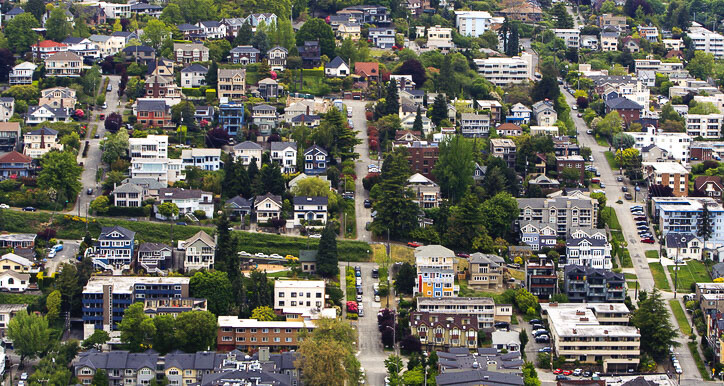
Mark Harmsworth of the Washington Policy Center says it’s time the government got out of the way, repeal unnecessary and over burdensome laws and let builders and property owners develop more available property
Mark Harmsworth
Washington Policy Center
It seems everyday we hear state officials and politicians talking about the need for affordable housing, both for purchase and rent in Washington, and yet the laws and rulemaking passed by those same officials, has the opposite effect.

Take the recently passed energy code restrictions passed (without legislative oversight) by the Washington State Building Code Council. The new rules are estimated to add an additional $24,070 to the cost of a new home.
The code bans the use of natural gas in new construction (plus some restrictive heat pump changes for retrofits) and will create an energy crisis in Washington. This is despite the rest of the nation moving to natural gas as an clean alternative to coal and oil based heat generation. On one hand, politicians, like Governor Jay Inslee, are pushing for an all-electric future by banning gas powered cars, increasing demand for electricity, while on the other hand advocating for the removal of the clean electricity producing Snake river dams. This is a shortsighted approach to energy policy. Energy experts are warning that Washington’s infrastructure already does not have the capacity to support the increase in electricity demand projected in the next few years.
Now add electric heat pumps into the mix and you may be forced to choose between charging your car or heating your house. The recent windstorm that knocked out power to thousands of homes with electric vehicles, just faced this problem.
Consider the existing permitting process for building a new home. The home builder has to navigate the complex permitting process and government regulations which takes time and money, all of which drives up the cost of construction. Seattle’s permitting process price list alone is 60 pages long.
The permitting process can take years to finish, driving up the cost of the construction as a developer has to front the cost of the land, planning and permitting before even starting to build. This complex and slow process is one of the main reasons we have a housing shortage today. According to the Building Industry Association of Washington, the state zoning process alone adds an average of $71,739 to the cost of a home. The National Association of Home Builders states that government regulations for construction of a new home now make up approximately 24% of the cost passed onto the home buyer. For a $600,000 home (hardly affordable or even available in Washington), that’s $144,000 in just the fees.
Rent control is another narrative pushed as a feel-good policy by lawmakers. The concept is that rent is capped at 3% per year, yet in reality, the legislation would end up costing the renter more in the long run. House Bill 1904 (HB 1904), introduced by Representative Strom Peterson (D), would increase rents and reduce available rental housing in the residential rental market. Along with a 3% cap on rent increases annually, a renter would also be able to terminate an existing lease, without penalty. Rents are going to increase as property owners will want higher rents to mitigate the risk of a renter walking away from a lease without a penalty. This cost will be passed onto all the renters, including ones with excellent credit and rental histories who pay rent on time.
Whoops – not so affordable after all.
Examples of direct legislation that has significantly increased of rents and the cost of construction here in Washington,
- The aforementioned unnecessary changes to the state energy code including the banning of natural gas in commercial and some residential new construction.
- Rent moratoriums, which will increase the cost of rent for all renters as property owners will have to recoup unpaid rent from those that didn’t pay.
- Restrictions on renter background checks that drive up the cost of rent for everyone to recover the cost to repair damage after a disruptive renter.
- Zoning and permit fee increases, particularly in Seattle and King County.
Some examples of government mandates that have indirectly increased the cost of owning a home in Washington include,
- Sound Transit Light Rail, promoted as a way to move significant numbers of people from affordable housing to places of employment is subsidized $179 per rider, with massive increases in car tabs and property taxes. Increased property taxes increase the cost of housing.
- HUD Grants that improve the energy efficiency of older apartment buildings, which on the surface appear to be a sound environmental choice, but the cost results are passed onto other homeowners in the taxing district in the form of increased property taxes.
- Litigation costs for subcontractor labor classification disputes that add to the cost of construction.
- Gas and diesel transportation costs increase, caused by the Washington legislature passing some of the highest gas taxes and fees in the US including the estimated $0.48 per gallon carbon tax that will appear at the pumps during January 2023.
The Washington Policy Center has some simple recommendations that will reduce the cost of building a home in Washington, without reducing accountability in the building process.
- Add a deadline to permit processing times. If the government agency fails to approve or deny the permit by the deadline, the permit fee is waived.
- Allow permits to be processed concurrently rather than sequentially or combine multi-agency permits into one.
- Identify simple permit categories that can be processed online and auto approved.
- Exempt interior remodels from permitting as long as the remodel doesn’t alter the buildings footprint.
State and local municipalities can do a lot to help reduce the cost of housing by repealing restrictive laws and stop passing ‘feel good’ legislation that does little to help the long-term market conditions. That’s not to say there should be any regulations on home construction, certainly there needs to be safety regulations, but many laws are imposed with no regard for the cost to implement the law.
It’s time the government got out of the way, repeal unnecessary and over burdensome laws and let builders and property owners develop more available property. Then housing costs will come down.
Mark Harmsworth is the director of the Small Business Center at the Washington Policy Center.
Also read:
- POLL: Why did voters reject all three tax proposals in the April 22 special election?Clark County voters rejected all three tax measures on the April 22 special election ballot, prompting questions about trust, affordability, and communication.
- Opinion: The war on parental rightsNancy Churchill argues that Olympia lawmakers are undermining voter-approved parental rights by rewriting key legislation and silencing dissent.
- Opinion: An Earth Day Lesson – Last year’s biggest environmental victories came from free marketsTodd Myers argues that Earth Day should highlight free-market solutions and grassroots innovation as more effective tools for environmental stewardship than top-down mandates.
- Opinion: Time to limit emergency clauses and give voters a choiceTodd Myers urges the governor to remove emergency clauses from bills that appear intended to block voter input rather than address real emergencies.
- Letter: C-TRAN Board improper meeting conductCamas resident Rick Vermeers criticizes the C-TRAN Board for misusing parliamentary procedure during a controversial vote on light rail.










